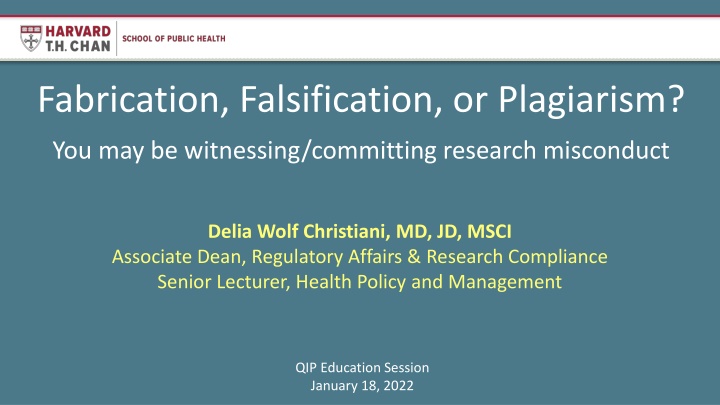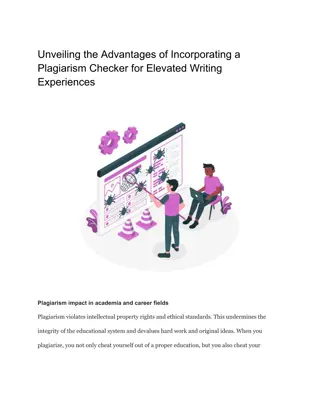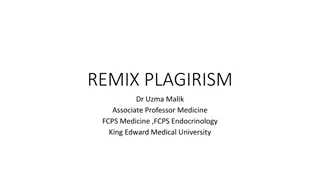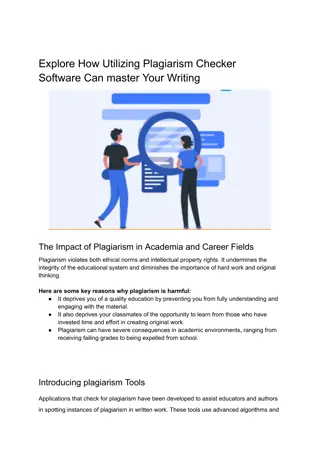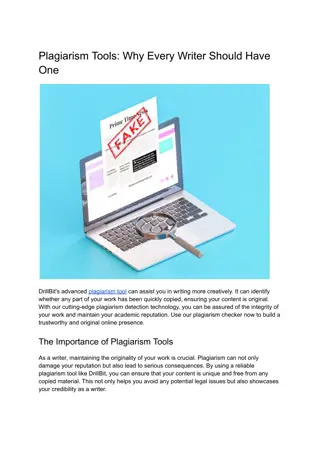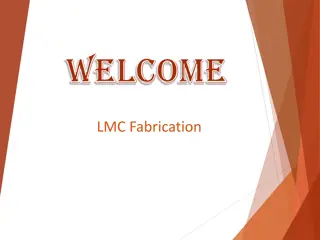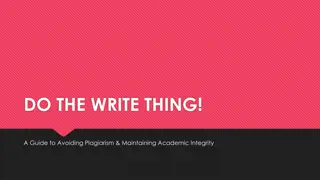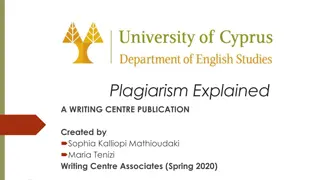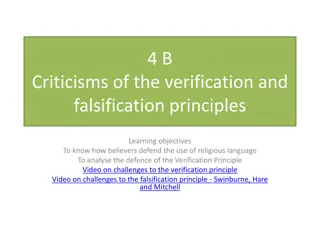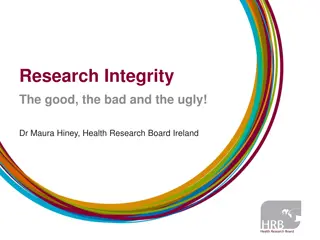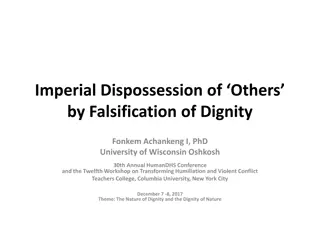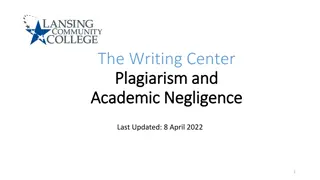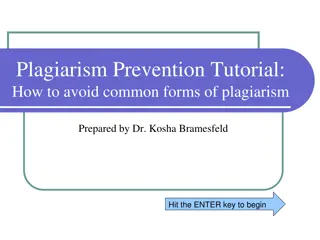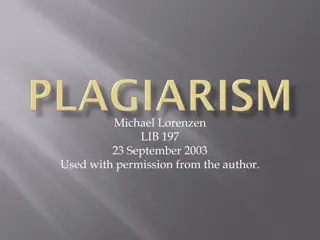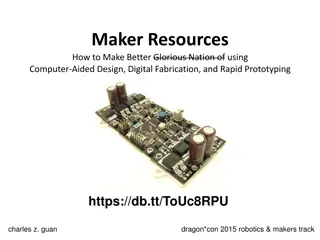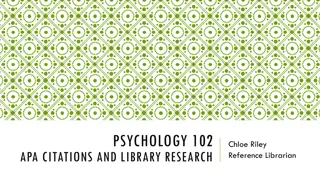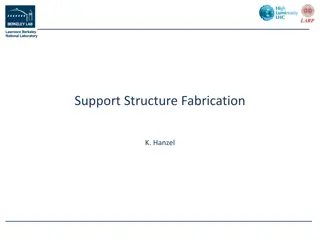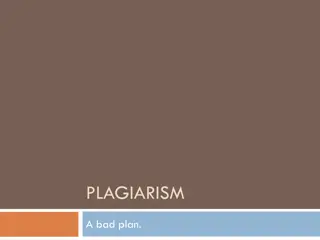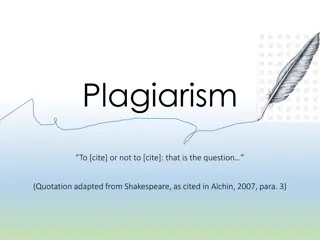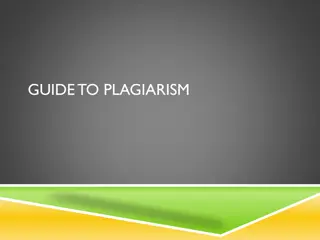Fabrication, Falsification, or Plagiarism?
The definitions of fabrication, falsification, and plagiarism in research misconduct. Learn what constitutes research misconduct and how to respond to suspicions. Explore real-life scenarios and ethical considerations related to academic integrity.
Uploaded on Feb 16, 2025 | 0 Views
Download Presentation

Please find below an Image/Link to download the presentation.
The content on the website is provided AS IS for your information and personal use only. It may not be sold, licensed, or shared on other websites without obtaining consent from the author.If you encounter any issues during the download, it is possible that the publisher has removed the file from their server.
You are allowed to download the files provided on this website for personal or commercial use, subject to the condition that they are used lawfully. All files are the property of their respective owners.
The content on the website is provided AS IS for your information and personal use only. It may not be sold, licensed, or shared on other websites without obtaining consent from the author.
E N D
Presentation Transcript
Fabrication, Falsification, or Plagiarism? You may be witnessing/committing research misconduct Delia Wolf Christiani, MD, JD, MSCI Associate Dean, Regulatory Affairs & Research Compliance Senior Lecturer, Health Policy and Management QIP Education Session January 18, 2022
Outline Definitions Short cases/videos* discussion Harvard Chan School Policies & Procedures: Responding to Allegations of Research Misconduct *All short videos and discussion questions are from The Office of Research Integrity (ORI) website: https://ori.hhs.gov/videos/case-study-list/3042
What Constitutes Research Misconduct? The use of placeholder (https://ori.hhs.gov/images/ddblock/SCRIPT-04-hi-res.mp4 Is including falsified data (placeholder) in grant applications research conduct? What if the grant does not get funded? Is there a difference in the quality of data needed in grant application vs publications? If the postdoc did find a placeholder and it was included in the grant application, is he responsible for research misconduct?
What Constitutes Research Misconduct? You suspect Research Misconduct, now what? https://ori.hhs.gov/images/ddblock/SCRIPT-11-hi-res.mp4 What form of research misconduct might this be? What should the graduate student do in this situation? Are the possible benefits of remaining silent greater than the potential fallout if someone else figures out that misconduct occurred? If you were in this situation, who would you talk to for advice or to report your suspicions?
Definitions Research Misconduct means fabrication, falsification, or plagiarism, in proposing, performing, or reviewing research, or in reporting research results. It does not include honest error or differences of opinion Fabrication is making up data or results and recording or reporting them Falsification is manipulating research materials, equipment, or processes, or changing or omitting data or results such that the research is not accurately represented in the research record
Definitions (cont.) Plagiarism is the appropriation of another person's ideas, processes, results, or words without giving appropriate credit ORI considers plagiarism to include both the theft or misappropriation of intellectual property and the substantial unattributed textual copying of another's work. It does not include authorship or credit disputes. unauthorized use of ideas or unique methods obtained by a privileged communication, such as a grant or manuscript review self-plagiarism occurs when authors reuse their own previously published written work or data as a new written product. However, 42 CFR Part 93 does not consider self-plagiarism to be research misconduct.
Definitions (cont.) Allegation means a disclosure of possible research misconduct through any means of communication. The disclosure may be by written or oral statement or other credible and significant indication of possible research misconduct made to an institutional official Whistleblower/Complainant is an individual who makes or demonstrates an intent to make an allegation of research misconduct
Definitions (cont.) Good faith allegation means an allegation made with a belief in the truth of the allegation which a reasonable person in the whistleblower's position could hold based upon the facts Retaliation means an adverse action taken against a complainant, witness, or committee member by the institution or one of its institutional members in response to (1) a good faith allegation of research misconduct; or (2) good faith cooperation with a research misconduct proceeding Preponderance of the evidence means proof by information that, compared with that opposing it, leads to the conclusion that the fact at issues is more probably true than not
Definitions (cont.) Inquiry means preliminary information-gathering and preliminary fact- finding to determine whether an allegation or apparent instance of research misconduct warrants an investigation Investigation means the formal examination of research record leading to a decision not to make a finding of research misconduct or to a recommendation for a finding of research misconduct Research Integrity Officer (RIO) is an institutional official, who is responsible for assessing allegations of research misconduct and determining when such allegations warrant inquiries and for overseeing inquiries and investigations
Research Misconduct Public Health Service Policies on Research Misconduct, 42 CFR 50 & 93 Office of Research Integrity: http://ori.hhs.gov Be familiar with your institutional policy The institution may make findings of research misconduct or other breaches of research integrity under internal policies and standards adopted by the institution even if no misconduct or other breaches of integrity are found under the HHS regulation 10
Institutional Policies Harvard Chan School Associate Dean for Regulatory Affairs & Research Compliance, Delia Wolf Christiani (RIO): dwchristiani@hsph.harvard.edu Research Misconduct Policy: https://www.hsph.harvard.edu/regulatory- affairs-and-research-compliance/research-integrity-at-harvard-t-h-chan- school-of-public-health/ Harvard Faculty of Medicine (HMS and HSDM) Office of Research Integrity https://ari.hms.harvard.edu/academic-integrity
Response to Research Misconduct Preliminary Assessment Institutional Decision Administrative Actions Inquiry Investigation
Preliminary Assessment Falsification: substituting one subject's record for that of another subject; failing to update the patients' status and representing data from prior contacts as being current falsifying protein immunoblot data by reusing and relabeling the same images to represent different experimental conditions Preliminary Assessment Institutional Decision Administrative Actions Inquiry Investigation
Preliminary Assessment (cont.) Fabrication: creating records of interviews of subjects that were never performed making up progress notes for patient visits that never took place and inserting them into the medical record to support published and unpublished research reports preparing records for calls and follow-up contacts to subjects who had already died Preliminary Assessment Institutional Decision Administrative Actions Inquiry Investigation
Inquiry Following the preliminary assessment, if the institutional official determines that the allegation provides sufficient information to allow specific follow-up, he/she should immediately initiate the inquiry process The purpose of the inquiry is to make a preliminary evaluation of the available evidence and testimony of the respondent, whistleblower, and key witnesses to determine whether there is sufficient evidence of possible research misconduct to warrant an investigation Preliminary Assessment Institutional Decision Administrative Actions Inquiry Investigation
Investigation The purpose of the investigation is to explore in detail the allegations, to examine the evidence in depth, and to determine specifically whether misconduct has been committed, by whom, and to what extent The findings of the investigation need to be set forth in an investigation report that is submitted ORI for oversight review Preliminary Assessment Institutional Decision Administrative Actions Inquiry Investigation
Institutional Decisions The institution s deciding official usually makes the final determination whether to accept the investigation report, its findings, and the recommended institutional actions For Federally funded research the deciding official's determination, together with the investigation committee's report, constitutes the final investigation report for purposes of ORI review When a final decision on the case has been reached, the institution needs to notify both the respondent and the whistleblower in writing Preliminary Assessment Institutional Decision Administrative Actions Inquiry Investigation
Finding of Research Misconduct There must be significant departure from accepted practices of the relevant research community The misconduct must have been committed intentionally, knowingly, or recklessly The allegation must be proven by preponderance of the evidence
Burden of Proof The institution has the burden of proving research misconduct Evidentiary standards ( 93.106 (b)) Burden of proof. (1) The institution or HHS has the burden of proof for making a finding of research misconduct. The destruction, absence of, or respondent s failure to provide research records adequately documenting the questioned research is evidence of research misconduct. The respondent must prove by a preponderance of the evidence that honest error or difference of opinion occurred The finder of fact must give due consideration to admissible, credible evidence of honest error or difference of opinion presented by respondent
Administrative Actions The administrative actions ORI may take against respondents include, but are not limited to: debarment from eligibility to receive Federal funds for grants and contracts prohibition from service on PHS advisory committees, peer review committees, or as consultants certification of information sources by respondent that is forwarded by institution certification of data by institution imposition of supervision on the respondent by the institution submission of a correction and/or retraction of a published article by respondent https://ori.hhs.gov/ORI_PHS_alert.html?d=update
I Wrote it, Why Re-write it? https://ori.hhs.gov/images/ddblock/SCRIPT-07-hi-res.mp4 Was the graduate student (GS) right to be concerned about this practice? What form of research misconduct might this be? What might happen if the PI does not change the text before publications? Would that be self-plagiarism? What do you think of the GS s decision to not talk to anyone about her concerns? What would you do in her place?
Crossing the Line into Misconduct https://ori.hhs.gov/images/ddblock/SCRIPT-06-hi-res.mp4 What form of research misconduct might this be? What is the difference between beautifying an image and purposefully changing it? Is it possible to falsify an image through beautification practices? Why do you think the chose to falsify his data? Are there external pressures that influenced his decision? What would you do in his place?
Questions? Delia Wolf Christiani, dwchristiani@hsph.harvard.edu Alyssa Speier, aspeier@hsph.harvard.edu ORARC Website (Research Misconduct), https://www.hsph.harvard.edu/regulatory-affairs-and-research- compliance/research-integrity-at-harvard-t-h-chan-school-of-public- health/
